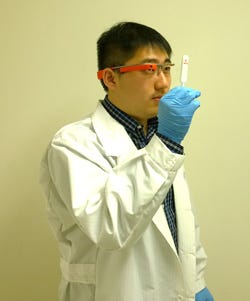Google Glass app has a vision for medical diagnostics
The Google Glass apps just keep on coming. Researchers at the Henry Samueli School of Engineering and Applied Science at the Univesity of California, Los Angeles, (UCLA) have developed a Google Glass application networked with a server platform that allows users to perform instant, wireless diagnostic testing for a variety of diseases and health conditions.
March 11, 2014
The Google Glass apps just keep on coming. Researchers at the Henry Samueli School of Engineering and Applied Science at the Univesity of California, Los Angeles, (UCLA) have developed a Google Glass application networked with a server platform that allows users to perform instant, wireless diagnostic testing for a variety of diseases and health conditions.
 "A good deal of diagnostic tests are easy to perform but require a trained eye to interpret the results," writes MedGadget in an article about the technology. "Particularly with lateral flow assays, most famously used in at-home pregnancy test strips, simply knowing which lines mean what for different tests can require significant training and memorization. But cameras and computers can help automate that process and Google Glass has both, and in a convenient form."
"A good deal of diagnostic tests are easy to perform but require a trained eye to interpret the results," writes MedGadget in an article about the technology. "Particularly with lateral flow assays, most famously used in at-home pregnancy test strips, simply knowing which lines mean what for different tests can require significant training and memorization. But cameras and computers can help automate that process and Google Glass has both, and in a convenient form."
The camera embedded in the eyewear captures an image of the rapid diagnostic test, which is uploaded to the server. Researchers conducted tests under various ambient and lighting conditions using commercially available HIV and prostate tests. Blurry images were read accurately 96.9% of the time; images taken under more optimal conditions were analyzed correctly 99.6% of the time. Results are typically available in as little as 8 seconds.
In addition to designing the custom RDT-reader app for Google Glass, principal investigator Aydogan Ozcan and his team programmed the server to rapidly evaluate test results coming from multiple devices simultaneously. Users are able to view test results, maps charting the geographical spread of various diseases and conditions, and the cumulative data from all the tests they have submitted over time.
"This smart app allows for real-time tracking of health conditions and could be quite valuable in epidemiology, mobile health, and telemedicine," says Ozcan.
Google Glass is one of several technologies profiled in a slideshow on cool wearable medical devices on PlasticsToday. View it here. |
The technology is described in greater detail on the UCLA website; researchers Steve Feng (first author), Romain Caire, Bingen Cortazar, Mehmet Turan, and Andrew Wong, all with UCLA's electrical engineering department, have published a paper about the research in the peer-reviewed journal, ACS Nano.
About the Author(s)
You May Also Like




